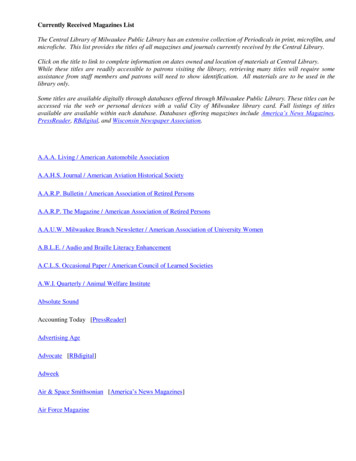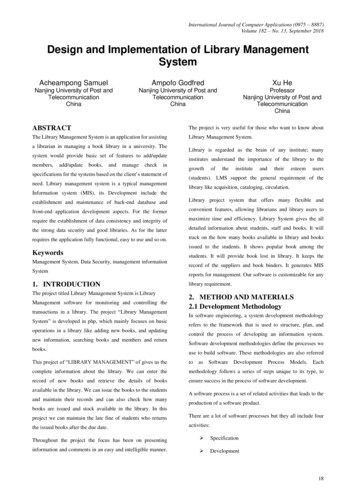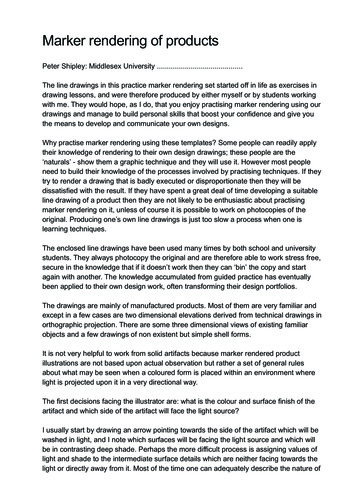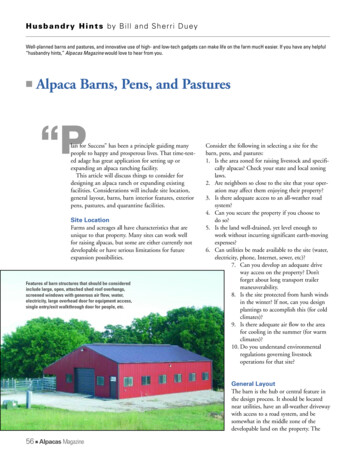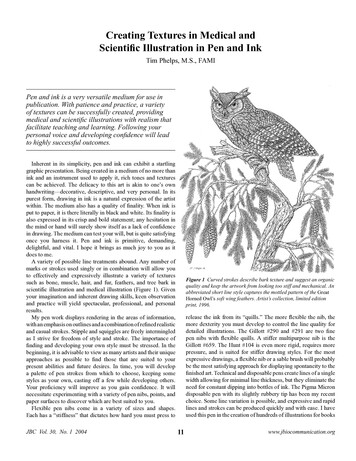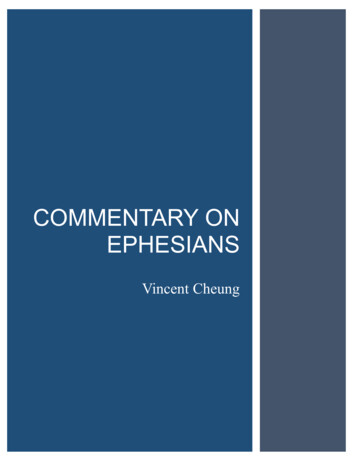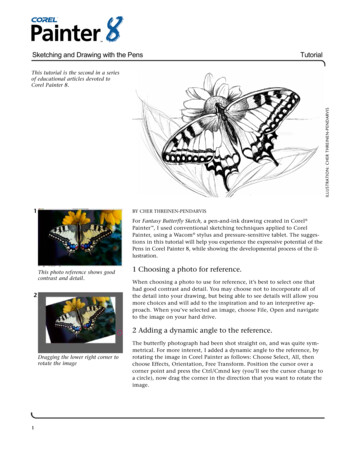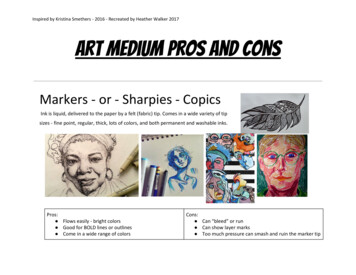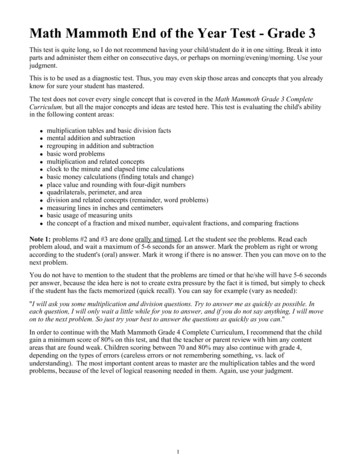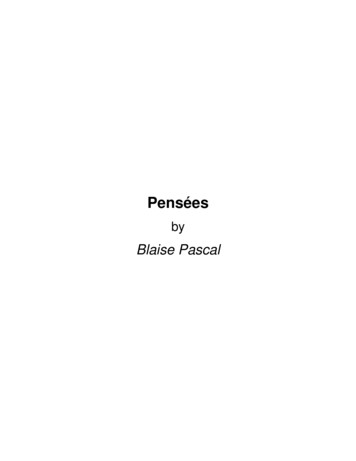
Transcription
PenséesbyBlaise Pascal
About Pensées by Blaise ghts:Date Created:Contributor(s):CCEL Subjects:LC Call no:LC ensees.htmlPascal, Blaise (1623-1662)Trotter, W.F. (Translator)Christian Classics Ethereal Library, Grand Rapids, MIPublic Domain2002-07-10Jon Van Hofwegen (Markup)All; Theology; ClassicB1901 .P4 1944Philosophy (General)By Period (Including individual philosophers and schools ofphilosophy)ModernBy region or country
PenséesBlaise PascalTable of ContentsAbout This Book. . . . . . . . . . . . . . . . . . . . . . . . . . . . . . . . . . . . . . p. iiPENSÉES . . . . . . . . . . . . . . . . . . . . . . . . . . . . . . . . . . . . . . . . . p. 1SECTION I: THOUGHTS ON MIND AND ON STYLE . . . . . . . . . . . . . p. 2SECTION II: THE MISERY OF MAN WITHOUT GOD . . . . . . . . . . . . . p. 9SECTION III: OF THE NECESSITY OF THE WAGER . . . . . . . . . . . . . p. 31SECTION IV: OF THE MEANS OF BELIEF . . . . . . . . . . . . . . . . . . . . p. 42SECTION V: JUSTICE AND THE REASON OF EFFECTS . . . . . . . . . . p. 49SECTION VI: THE PHILOSOPHERS . . . . . . . . . . . . . . . . . . . . . . . . p. 56SECTION VII: MORALITY AND DOCTRINE . . . . . . . . . . . . . . . . . . . p. 65SECTION VIII: THE FUNDAMENTALS OF THE CHRISTIAN RELIGION. . . . . . . . . . . . . . . . . . . . . . . . . . . . . . . . . . . . . . . . . . . . . . . . . p. 89SECTION IX: PERPETUITY . . . . . . . . . . . . . . . . . . . . . . . . . . . . . . p. 96SECTION X: TYPOLOGY . . . . . . . . . . . . . . . . . . . . . . . . . . . . . . . p. 107SECTION XI: THE PROPHECIES . . . . . . . . . . . . . . . . . . . . . . . . . . p. 117SECTION XII: PROOFS OF JESUS CHRIST . . . . . . . . . . . . . . . . . . . p. 132SECTION XIII: THE MIRACLES . . . . . . . . . . . . . . . . . . . . . . . . . . . p. 142SECTION XIV: APPENDIX: POLEMICAL FRAGMENTS . . . . . . . . . . . p. 154Indexes. . . . . . . . . . . . . . . . . . . . . . . . . . . . . . . . . . . . . . . . . . . . p. 163Index of Scripture References. . . . . . . . . . . . . . . . . . . . . . . . . . . . p. 163iii
PenséesBlaise Pascaliv
PenseesBlaise PascalPENSÉESby Blaise Pascal1660translated by W. F. TrotterPENSÉES
PenseesBlaise PascalSECTION I: THOUGHTS ON MIND AND ON STYLE1. The difference between the mathematical and the intuitive mind.—In the one, the principlesare palpable, but removed from ordinary use; so that for want of habit it is difficult to turn one'smind in that direction: but if one turns it thither ever so little, one sees the principles fully, and onemust have a quite inaccurate mind who reasons wrongly from principles so plain that it is almostimpossible they should escape notice.But in the intuitive mind the principles are found in common use and are before the eyes ofeverybody. One has only to look, and no effort is necessary; it is only a question of good eyesight,but it must be good, for the principles are so subtle and so numerous that it is almost impossiblebut that some escape notice. Now the omission of one principle leads to error; thus one must havevery clear sight to see all the principles and, in the next place, an accurate mind not to draw falsedeductions from known principles.All mathematicians would then be intuitive if they had clear sight, for they do not reasonincorrectly from principles known to them; and intuitive minds would be mathematical if they couldturn their eyes to the principles of mathematics to which they are unused.The reason, therefore, that some intuitive minds are not mathematical is that they cannot at allturn their attention to the principles of mathematics. But the reason that mathematicians are notintuitive is that they do not see what is before them, and that, accustomed to the exact and plainprinciples of mathematics, and not reasoning till they have well inspected and arranged theirprinciples, they are lost in matters of intuition where the principles do not allow of such arrangement.They are scarcely seen; they are felt rather than seen; there is the greatest difficulty in making themfelt by those who do not of themselves perceive them. These principles are so fine and so numerousthat a very delicate and very clear sense is needed to perceive them, and to judge rightly and justlywhen they are perceived, without for the most part being able to demonstrate them in order as inmathematics, because the principles are not known to us in the same way, and because it would bean endless matter to undertake it. We must see the matter at once, at one glance, and not by a processof reasoning, at least to a certain degree. And thus it is rare that mathematicians are intuitive andthat men of intuition are mathematicians, because mathematicians wish to treat matters of intuitionmathematically and make themselves ridiculous, wishing to begin with definitions and then withaxioms, which is not the way to proceed in this kind of reasoning. Not that the mind does not doso, but it does it tacitly, naturally, and without technical rules; for the expression of it is beyond allmen, and only a few can feel it.Intuitive minds, on the contrary, being thus accustomed to judge at a single glance, are soastonished when they are presented with propositions of which they understand nothing, and theway to which is through definitions and axioms so sterile, and which they are not accustomed tosee thus in detail, that they are repelled and disheartened.But dull minds are never either intuitive or mathematical.Mathematicians who are only mathematicians have exact minds, provided all things are explainedto them by means of definitions and axioms; otherwise they are inaccurate and insufferable, forthey are only right when the principles are quite clear.2
PenseesBlaise PascalAnd men of intuition who are only intuitive cannot have the patience to reach to first principlesof things speculative and conceptual, which they have never seen in the world and which arealtogether out of the common.2. There are different kinds of right understanding; some have right understanding in a certainorder of things, and not in others, where they go astray. Some draw conclusions well from a fewpremises, and this displays an acute judgment.Others draw conclusions well where there are many premises.For example, the former easily learn hydrostatics, where the premises are few, but the conclusionsare so fine that only the greatest acuteness can reach them.And in spite of that these persons would perhaps not be great mathematicians, becausemathematics contain a great number of premises, and there is perhaps a kind of intellect that cansearch with ease a few premises to the bottom and cannot in the least penetrate those matters inwhich there are many premises.There are then two kinds of intellect: the one able to penetrate acutely and deeply into theconclusions of given premises, and this is the precise intellect; the other able to comprehend a greatnumber of premises without confusing them, and this is the mathematical intellect. The one hasforce and exactness, the other comprehension. Now the one quality can exist without the other; theintellect can be strong and narrow, and can also be comprehensive and weak.3. Those who are accustomed to judge by feeling do not understand the process of reasoning,for they would understand at first sight and are not used to seek for principles. And others, on thecontrary, who are accustomed to reason from principles, do not at all understand matters of feeling,seeking principles and being unable to see at a glance.4. Mathematics, intuition.—True eloquence makes light of eloquence, true morality makes lightof morality; that is to say, the morality of the judgement, which has no rules, makes light of themorality of the intellect.For it is to judgement that perception belongs, as science belongs to intellect. Intuition is thepart of judgement, mathematics of intellect.To make light of philosophy is to be a true philosopher.5. Those who judge of a work by rule are in regard to others as those who have a watch are inregard to others. One says, "It is two hours ago"; the other says, "It is only three-quarters of anhour." I look at my watch, and say to the one, "You are weary," and to the other, "Time gallopswith you"; for it is only an hour and a half ago, and I laugh at those who tell me that time goesslowly with me and that I judge by imagination. They do not know that I judge by my watch.6. Just as we harm the understanding, we harm the feelings also.The understanding and the feelings are moulded by intercourse; the understanding and feelingsare corrupted by intercourse. Thus good or bad society improves or corrupts them. It is, then,all-important to know how to choose in order to improve and not to corrupt them; and we cannotmake this choice, if they be not already improved and not corrupted. Thus a circle is formed, andthose are fortunate who escape it.7. The greater intellect one has, the more originality one finds in men. Ordinary persons findno difference between men.8. There are many people who listen to a sermon in the same way as they listen to vespers.9. When we wish to correct with advantage and to show another that he errs, we must noticefrom what side he views the matter, for on that side it is usually true, and admit that truth to him,3
PenseesBlaise Pascalbut reveal to him the side on which it is false. He is satisfied with that, for he sees that he was notmistaken and that he only failed to see all sides. Now, no one is offended at not seeing everything;but one does not like to be mistaken, and that perhaps arises from the fact that man naturally cannotsee everything, and that naturally he cannot err in the side he looks at, since the perceptions of oursenses are always true.10. People are generally better persuaded by the reasons which they have themselves discoveredthan by those which have come into the mind of others.11. All great amusements are dangerous to the Christian life; but among all those which theworld has invented there is none more to be feared than the theatre. It is a representation of thepassions so natural and so delicate that it excites them and gives birth to them in our hearts, and,above all, to that of love, principally when it is represented as very chaste and virtuous. For themore innocent it appears to innocent souls, the more they are likely to be touched by it. Its violencepleases our self-love, which immediately forms a desire to produce the same effects which are seenso well represented; and, at the same time, we make ourselves a conscience founded on the proprietyof the feelings which we see there, by which the fear of pure souls is removed, since they imaginethat it cannot hurt their purity to love with a love which seems to them so reasonable.So we depart from the theatre with our heart so filled with all the beauty and tenderness of love,the soul and the mind so persuaded of its innocence, that we are quite ready to receive its firstimpressions, or rather to seek an opportunity of awakening them in the heart of another, in orderthat we may receive the same pleasures and the same sacrifices which we have seen so wellrepresented in the theatre.12. Scaramouch, who only thinks of one thing.The doctor, who speaks for a quarter of an hour after he has said everything, so full is he of thedesire of talking.13. One likes to see the error, the passion of Cleobuline, because she is unconscious of it. Shewould be displeasing, if she were not deceived.14. When a natural discourse paints a passion or an effect, one feels within oneself the truth ofwhat one reads, which was there before, although one did not know it. Hence one is inclined tolove him who makes us feel it, for he has not shown us his own riches, but ours. And thus thisbenefit renders him pleasing to us, besides that such community of intellect as we have with himnecessarily inclines the heart to love.15. Eloquence, which persuades by sweetness, not by authority; as a tyrant, not as a king.16. Eloquence is an art of saying things in such a way (1) that those to whom we speak maylisten to them without pain and with pleasure; (2) that they feel themselves interested, so thatself-love leads them more willingly to reflection upon it.It consists, then, in a correspondence which we seek to establish between the head and the heartof those to whom we speak, on the one hand, and, on the other, between the thoughts and theexpressions which we employ. This assumes that we have studied well the heart of man so as toknow all its powers and, then, to find the just proportions of the discourse which we wish to adaptto them. We must put ourselves in the place of those who are to hear us, and make trial on our ownheart of the turn which we give to our discourse in order to see whether one is made for the other,and whether we can assure ourselves that the hearer will be, as it were, forced to surrender. Weought to restrict ourselves, so far as possible, to the simple and natural, and not to magnify that4
PenseesBlaise Pascalwhich is little, or belittle that which is great. It is not enough that a thing be beautiful; it must besuitable to the subject, and there must be in it nothing of excess or defect.17. Rivers are roads which move, and which carry us whither we desire to go.18. When we do not know the truth of a thing, it is of advantage that there should exist a commonerror which determines the mind of man, as, for example, the moon, to which is attributed thechange of seasons, the progress of diseases, etc. For the chief malady of man is restless curiosityabout things which he cannot understand; and it is not so bad for him to be in error as to be curiousto no purpose.The manner in which Epictetus, Montaigne, and Salomon de Tultie wrote is the most usual, themost suggestive, the most remembered, and the oftenest quoted, because it is entirely composedof thoughts born from the common talk of life. As when we speak of the common error which existsamong men that the moon is the cause of everything, we never fail to say that Salomon de Tultiesays that, when we do not know the truth of a thing, it is of advantage that there should exist acommon error, etc.; which is the thought above.19. The last thing one settles in writing a book is what one should put in first.20. Order.—Why should I undertake to divide my virtues into four rather than into six? Whyshould I rather establish virtue in four, in two, in one? Why into Abstine et sustine 1 rather than into"Follow Nature," or, "Conduct your private affairs without injustice," as Plato, or anything else?But there, you will say, everything is contained in one word. Yes, but it is useless withoutexplanation, and when we come to explain it, as soon as we unfold this maxim which contains allthe rest, they emerge in that first confusion which you desired to avoid. So, when they are allincluded in one, they are hidden and useless, as in a chest, and never appear save in their naturalconfusion. Nature has established them all without including one in the other.21. Nature has made all her truths independent of one another. Our art makes one dependenton the other. But this is not natural. Each keeps its own place.22. Let no one say that I have said nothing new; the arrangement of the subject is new. Whenwe play tennis, we both play with the same ball, but one of us places it better.I had as soon it said that I used words employed before. And in the same way if the samethoughts in a different arrangement do not form a different discourse, no more do the same wordsin their different arrangement form different thoughts!23. Words differently arranged have a different meaning, and meanings differently arrangedhave different effects.24. Language.—We should not turn the mind from one thing to another, except for relaxation,and that when it is necessary and the time suitable, and not otherwise. For he that relaxes out ofseason wearies, and he who wearies us out of season makes us languid, since we turn quite away.So much does our perverse lust like to do the contrary of what those wish to obtain from us withoutgiving us pleasure, the coin for which we will do whatever is wanted.25. Eloquence.—It requires the pleasant and the real; but the pleasant must itself be drawn fromthe true.26. Eloquence is a painting of thought; and thus those who, after having painted it, add somethingmore, make a picture instead of a portrait.1"Abstain and uphold." Stoic maxim.5
PenseesBlaise Pascal27. Miscellaneous. Language.—Those who make antitheses by forcing words are like thosewho make false windows for symmetry. Their rule is not to speak accurately, but to make apt figuresof speech.28. Symmetry is what we see at a glance; based on the fact that there is no reason for anydifference, and based also on the face of man; whence it happens that symmetry is only wanted inbreadth, not in height or depth.29. When we see a natural style, we are astonished and delighted; for we expected to see anauthor, and we find a man. Whereas those who have good taste, and who, seeing a book, expect tofind a man, are quite surprised to find an author. Plus poetice quam humane locutus es. 2 Thosehonour Nature well who teach that she can speak on everything, even on theology.30. We only consult the ear because the heart is wanting. The rule is uprightness.Beauty of omission, of judgement.31. All the false beauties which we blame in Cicero have their admirers, and in great number.32. There is a certain standard of grace and beauty which consists in a certain relation betweenour nature, such as it is, weak or strong, and the thing which pleases us.Whatever is formed according to this standard pleases us, be it house, song, discourse, verse,prose, woman, birds, rivers, trees, rooms, dress, etc. Whatever is not made according to this standarddispleases those who have good taste.And as there is a perfect relation between a song and a house which are made after a goodmodel, because they are like this good model, though each after its kind; even so there is a perfectrelation between things made after a bad model. Not that the bad model is unique, for there aremany; but each bad sonnet, for example, on whatever false model it is formed, is just like a womandressed after that model.Nothing makes us understand better the ridiculousness of a false sonnet than to consider natureand the standard and, then, to imagine a woman or a house made according to that standard.33. Poetical beauty.—As we speak of poetical beauty, so ought we to speak of mathematicalbeauty and medical beauty. But we do not do so; and the reason is that we know well what is theobject of mathematics, and that it consists in proofs, and what is the object of medicine, and thatit consists in healing. But we do not know in what grace consists, which is the object of poetry. Wedo not know the natural model which we ought to imitate; and through lack of this knowledge, wehave coined fantastic terms, "The golden age," "The wonder of our times," "Fatal," etc., and callthis jargon poetical beauty.But whoever imagines a woman after this model, which consists in saying little things in bigwords, will see a pretty girl adorned with mirrors and chains, at whom he will smile; because weknow better wherein consists the charm of woman than the charm of verse. But those who areignorant would admire her in this dress, and there are many villages in which she would be takenfor the queen; hence we call sonnets made after this model "Village Queens."34. No one passes in the world as skilled in verse unless he has put up the sign of a poet, amathematician, etc. But educated people do not want a sign and draw little distinction between thetrade of a poet and that of an embroiderer.People of education are not called poets or mathematicians, etc.; but they are all these andjudges of all these. No one guesses what they are. When they come into society, they talk on matters2Petronius, 90. "You have spoken more as a poet than as a man."6
PenseesBlaise Pascalabout which the rest are talking. We do not observe in them one quality rather than another, savewhen they have to make use of it. But then we remember it, for it is characteristic of such personsthat we do not say of them that they are fine speakers, when it is not a question of oratory, and thatwe say of them that they are fine speakers, when it is such a question.It is therefore false praise to give a man when we say of him, on his entry, that he is a veryclever poet; and it is a bad sign when a man is not asked to give his judgement on some verses.35. We should not be able to say of a man, "He is a mathematician," or "a preacher," or"eloquent"; but that he is "a gentleman." That universal quality alone pleases me. It is a bad signwhen, on seeing a person, you remember his book. I would prefer you to see no quality till youmeet it and have occasion to use it (Ne quid minis), 3 for fear some one quality prevail and designatethe man. Let none think him a fine speaker, unless oratory be in question, and then let them thinkit.36. Man is full of wants: he loves only those who can satisfy them all. "This one is a goodmathematician," one will say. But I have nothing to do with mathematics; he would take me for aproposition. "That one is a good soldier." He would take me for a besieged town. I need, then, anupright man who can accommodate himself generally to all my wants.37. Since we cannot be universal and know all that is to be known of everything, we ought toknow a little about everything. For it is far better to know something about everything than to knowall about one thing. This universality is the best. If we can have both, still better; but if we mustchoose, we ought to choose the former. And the world feels this and does so; for the world is oftena good judge.38. A poet and not an honest man.39. If lightning fell on low places, etc., poets, and those who can only reason about things ofthat kind, would lack proofs.40. If we wished to prove the examples which we take to prove other things, we should haveto take those other things to be examples; for, as we always believe the difficulty is in what wewish to prove, we find the examples clearer and a help to demonstration.Thus, when we wish to demonstrate a general theorem, we must give the rule as applied to aparticular case; but if we wish to demonstrate a particular case, we must begin with the generalrule. For we always find the thing obscure which we wish to prove and that clear which we use forthe proof; for, when a thing is put forward to be proved, we first fill ourselves with the imaginationthat it is, therefore, obscure and, on the contrary, that what is to prove it is clear, and so we understandit easily.41. Epigrams of Martial.—Man loves malice, but not against one-eyed men nor the unfortunate,but against the fortunate and proud. People are mistaken in thinking otherwise.For lust is the source of all our actions, and humanity, etc. We must please those who havehumane and tender feelings. That epigram about two one-eyed people is worthless, for it does notconsole them and only gives a point to the author's glory. All that is only for the sake of the authoris worthless. Ambitiosa recident ornamenta. 442. To call a king "Prince" is pleasing, because it diminishes his rank.34"Nothing in excess."Horace, Epistle to the pisos, 447. "They curtailed pretentious ornaments."7
PenseesBlaise Pascal43. Certain authors, speaking of their works, say: "My book," "My commentary," "My history,"etc. They resemble middle-class people who have a house of their own and always have "My house"on their tongue. They would do better to say: "Our book," "Our commentary," "Our history," etc.,because there is in them usually more of other people's than their own.44. Do you wish people to believe good of you? Don't speak.45. Languages are ciphers, wherein letters are not changed into letters, but words into words,so that an unknown language is decipherable.46. A maker of witticisms, a bad character.47. There are some who speak well and write badly. For the place and the audience warm them,and draw from their minds more than they think of without that warmth.48. When we find words repeated in a discourse and, in trying to correct them, discover thatthey are so appropriate that we would spoil the discourse, we must leave them alone. This is thetest; and our attempt is the work of envy, which is blind, and does not see that repetition is not inthis place a fault; for there is no general rule.49. To mask nature and disguise her. No more king, pope, bishop—but august monarch, etc.;not Paris—the capital of the kingdom. There are places in which we ought to call Paris, "Paris,"others in which we ought to call it the capital of the kingdom.50. The same meaning changes with the words which express it. Meanings receive their dignityfrom words instead of giving it to them. Examples should be sought.51. Sceptic, for obstinate.52. No one calls another a Cartesian but he who is one himself, a pedant but a pedant, a provincialbut a provincial; and I would wager it was the printer who put it on the title of Letters to a Provincial.53. A carriage upset or overturned, according to the meaning. To spread abroad or upset,according to the meaning. (The argument by force of M. le Maitre over the friar.)54. Miscellaneous.—A form of speech, "I should have liked to apply myself to that."55. The aperitive virtue of a key, the attractive virtue of a hook.56. To guess: "The part that I take in your trouble." The Cardinal did not want to be guessed."My mind is disquieted." I am disquieted is better.57. I always feel uncomfortable under such compliments as these: "I have given you a greatdeal of trouble," "I am afraid I am boring you," "I fear this is too long." We either carry our audiencewith us, or irritate them.58. You are ungraceful: "Excuse me, pray." Without that excuse I would not have known therewas anything amiss. "With reverence be it spoken." The only thing bad is their excuse.59. "To extinguish the torch of sedition"; too luxuriant. "The restlessness of his genius"; twosuperfluous grand words.8
PenseesBlaise PascalSECTION II: THE MISERY OF MAN WITHOUT GOD60. First part: Misery of man without God.Second part: Happiness of man with God.Or, First part: That nature is corrupt. Proved by nature itself.Second part: That there is a Redeemer. Proved by Scripture.61. Order.—I might well have taken this discourse in an order like this: to show the vanity ofall conditions of men, to show the vanity of ordinary lives, and then the vanity of philosophic lives,sceptics, stoics; but the order would not have been kept. I know a little what it is, and how fewpeople understand it. No human science can keep it. Saint Thomas did not keep it. Mathematicskeep it, but they are useless on account of their depth.62. Preface to the first part.—To speak of those who have treated of the knowledge of self; ofthe divisions of Charron, which sadden and weary us; of the confusion of Montaigne; that he wasquite aware of his want of method and shunned it by jumping from subject to subject; that he soughtto be fashionable.His foolish project of describing himself! And this not casually and against his maxims, sinceevery one makes mistakes, but by his maxims themselves, and by first and chief design. For to saysilly things by chance and weakness is a common misfortune, but to say them intentionally isintolerable, and to say such as that.63. Montaigne.—Montaigne's faults are great. Lewd words; this is bad, notwithstandingMademoiselle de Gournay. Credulous; people without eyes. Ignorant; squaring the circle, a greaterworld. His opinions on suicide, on death. He suggests an indifference about salvation, without fearand without repentance. As his book was not written with a religious purpose, he was not boundto mention religion; but it is always our duty not to turn men from it. One can excuse his ratherfree and licentious opinions on some relations of life; but one cannot excuse his thoroughly paganviews on death, for a man must renounce piety altogether, if he does not at least wish to die like aChristian. Now, through the whole of his book his only conception of death is a cowardly andeffeminate one.64. It is not in Montaigne, but in myself, that I find all that I see in him.65. What good there is in Montaigne can only have been acquired with difficulty. The evil thatis in him, I mean apart from his morality, could have been corrected in a moment, if he had beeninformed that he made too much of trifles and spoke too much of himself.66. One must know oneself. If this does not serve to discover truth, it at least serves as a ruleof life, and there is nothing better.67. The vanity of the sciences.—Physical science will not console me for the ignorance ofmorality in the time of affliction. But the science of ethics will always console me for the ignoranceof the physical sciences.68. Men are never taught to be gentlemen and are taught everything else; and they never plumethemselves so much on the rest of their knowledge as on knowing how to be gentlemen. They onlyplume themselves on knowing the one thing they do not know.69. The infinites, the mean.—When we read too fast or too slowly, we understand nothing.9
PenseesBlaise Pascal70. Nature. —Nature has set us so well in the centre, that if we change one side of the balance,we change the other also. This makes me believe that the springs in our brain are so adjusted thathe who touches one touches also its contrary.71. Too much and too little wine. Give him none, he cannot find truth; give him too much, thesame.72. Man's disproportion.—This is where our innate knowledge leads us. If it be not true, thereis no truth in man; and if it be true, he finds therein great cause for humiliation, being compelledto abase himself in one way or another. And since he cannot
Christian Classics Ethereal Library, Grand Rapids, MI. Description: Rights: Public Domain. Date Created: 2002-07-10. Contributor(s): Jon Van Hofwegen (Markup) CCEL Subjects: All; Theology; Classic. LC Call no: B1901 .P4 1944. LC Subjects: Philosophy (General) By Period (Including individual philosophers and schools of philosophy) Modern By .File Size: 591KBPage Count: 169Explore furtherThe Project Gutenberg eBook of Pascal's Pensées, by .www.gutenberg.orgPensées, English edition - samizdatwww.samizdat.qc.caDe Profundis by Oscar Wilde - Free eBookmanybooks.netThe Flowers of Evil Charles Baudelaire Free . - Freeditorialfreeditorial.comMan's Search for Meaning - Antilogicalismantilogicalism.comRecommended to you b
